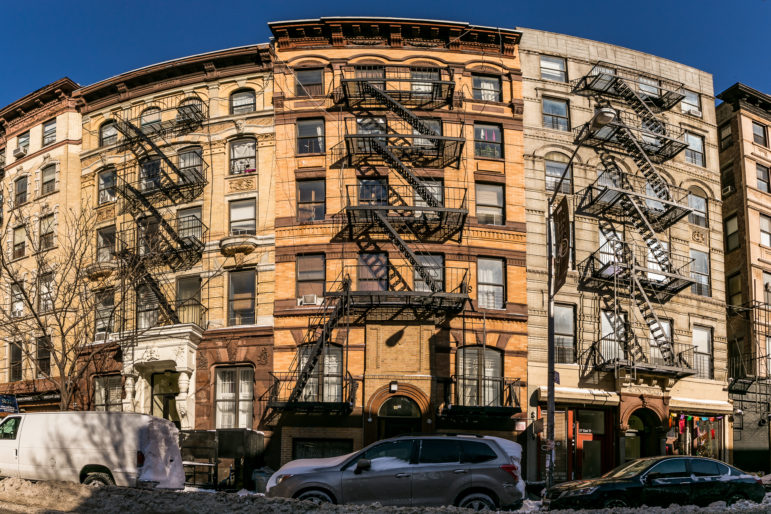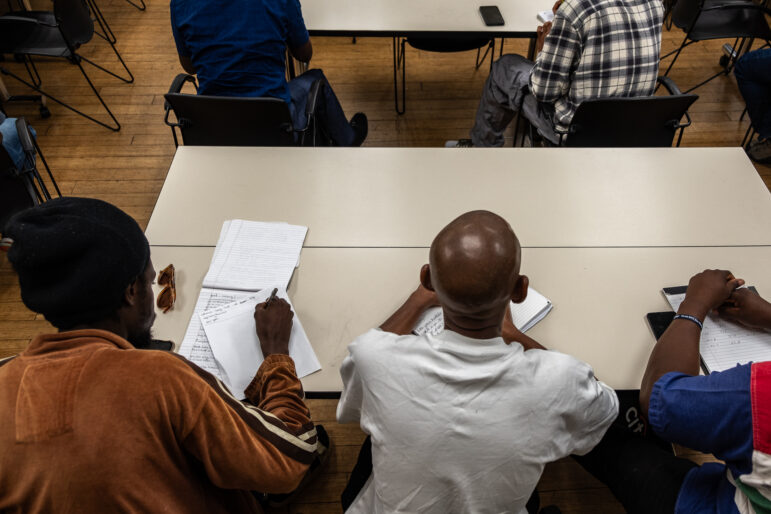“A parade of mayors, Democrat and Republican, have also predominantly relied on the private sector over the past 40 years to address the city’s lack of affordable housing. Yet here we are, after spending billions of public dollars, arguably mired in a worsening crisis.”
Adi Talwar
East Village buildings that are a part of the Cooper Square Community Land Trust.
CityViews are readers’ opinions, not those of City Limits. Add your voice today!
Congressman Dan Goldman recently sent an email announcing his support for State Sen. Zellnor Myrie’s mayoral bid. One of the main reasons cited for this endorsement is Myrie’s plan to tackle the city’s housing crisis, which, the Congressman wrote, “leverages the private sector to jumpstart a housing boom.”
A note to Rep. Goldman: a parade of mayors, Democrat and Republican, have also predominantly relied on the private sector over the past 40 years to address the city’s lack of affordable housing. Yet here we are, after spending billions of public dollars, arguably mired in a worsening crisis. Maybe it’s time for a different approach?
In January 1985, as unhoused families spilled onto the streets of the city and into newspaper headlines, Mayor Edward Koch launched a five-year, $4 billion plan to build and renovate 100,000 apartments, a proposal that soon grew to 10 years, $5 billion and 150,000 apartments. The Koch plan was a major departure in municipal policy: For decades, the construction of apartments for lower income individuals and families was largely financed by the federal government. That came to an abrupt halt under the Reagan administration.
With large swaths of the city’s housing decimated in the wake of the 1970s fiscal crisis and a wave of arson and landlord abandonment, Koch’s commitment of public funds was much needed. But the city’s resources, compared with the need, were relatively limited, so the plan relied heavily on for-profit housing developers.
The Koch plan became the template for ensuing mayors, though the Dinkins administration’s ambitions faced deep constraints from the recession of the early 1990s and the Giuliani administration was more concerned with villainizing low-income New Yorkers than building housing for them. Then came Mayor Michael Bloomberg, who launched his own ambitious New Housing Marketplace Plan—eventually growing to a $7.5 billion, 10-year initiative to create and preserve 165,000 units. As the Urban Land Institute noted in its 2012 award to the Bloomberg administration for the plan, one of its principal components was “harnessing the private market to create affordable and workforce housing.”
Mayor Bill de Blasio took an even bigger swing at the city’s shortfall in affordable housing, introducing a 10-year plan to create and preserve 200,000 apartments, later upping the ante to 12 years, 300,000 units at a cost of $16.9 billion. Despite his portrayal in the city’s tabloid press as a staunch leftist, de Blasio’s plan also largely depended upon for-profit housing developers.
Over the years 2014-2018, for-profit developers built nearly 80 percent of the newly constructed apartments under the de Blasio administration’s housing plan, according to a Community Service Society* report. A relatively small share of those apartments, just 18 percent, were affordable to the lowest income New Yorkers. Conversely, nonprofit developers created nearly double that share of apartments affordable to households with extremely low incomes—suggesting, not surprisingly, that the demand for profits has a direct effect on affordability levels.
Mayor Eric Adams, who once declared “I am real estate,” has basically pursued the contours of the remaining years of de Blasio’s plan while pushing the City of Yes initiative to make it easier to construct higher density buildings in more of the city. Adams also recently created a charter revision panel with the ostensible goal of finding ways to streamline the approval process for housing development. Prior mayors also made rezoning city neighborhoods and streamlining construction reviews part of their housing efforts, but didn’t empanel a charter commission to do it—leading some observers to question whether Adams’ real intent is to undercut the City Council’s own charter commission.
Despite all these initiatives over the past four decades, the city’s lack of affordable housing has seemingly worsened. On a recent February night, more than 85,000 people, including more than 35,000 children, spent the night in a city homeless shelter. As David Brand wrote last year on Gothamist, the vacancy rate for apartments in New York City was a miniscule 1.4 percent, the lowest in 50 years, and less than 1 percent for apartments renting for under $2,400. Among city households with incomes less than $25,000 (about 690,000 households in 2023, according to Statista) 86 percent were severely rent burdened, meaning rent swallowed at least half their income.
Such facts have led many housing advocates, along with some elected officials, to say it’s time to reorient the city’s approach and place a greater emphasis on social housing. Social housing is generally defined as housing that’s operated outside the profit-driven real estate market so it’s permanently affordable and controlled by community groups, building residents, or an entity like the city’s public housing authority.
It’s been part of the city’s terrain for decades. Public housing is largely a federal effort, and cutbacks in Washington have for years strained the finances of the 335 developments under the purview of the New York City Housing Authority. A recent CSS report noted that two of the city’s principal social housing programs, Neighborhood Pillars and Open Door, are thinly financed, a combined $70 million in the adopted budget for this year—not even a rounding error in the city’s capital plan.
Social housing proponents have championed bills in Albany and at City Hall that would help tilt efforts towards more community and resident driven housing. Earlier this month some 70 advocacy groups rallied in Albany for the Tenant Opportunity to Purchase Act, which would give tenants the first right to purchase a building when the owner puts it up for sale.
Proponents are also calling for the state budget to include $250 million to help tenants make purchases. “The Tenant Opportunity to Purchase Act would protect us from the churn of our profit-driven housing market, creating stable, resident-controlled social housing across our state,” said Cea Weaver of Housing Justice for All in a press release.
Myrie, who has shunned real estate industry donations in past campaigns but not for his mayoral run, is the prime sponsor of the bill in the State Senate but makes scant mention of it in his campaign’s 24-page housing plan.
William Alatriste/NYC Council Media Unit
City Councilmembers hold a rally in favor of social housing legislation in 2023.
On the city level, the Community Land Act would give nonprofit groups and community land trusts the first right to purchase a building when the owner puts it up for sale. Another component of the act would require the city to prioritize land trusts and other nonprofits when selling public land.
More than 100 community groups, from the Association for Neighborhood and Housing Development to the New Economy Project to the Urban Homesteading Assistance Board, have endorsed the provisions of the land act, which has stalled in the City Council, facing opposition from Mayor Adams and developers.
It would be wrong to dismiss the efforts of the past 40 years. Thousands of apartments were created or preserved at varying levels of affordability (though sometimes at extraordinary cost) and large swaths of devastated neighborhoods were redeveloped, such as in Mt. Eden in the South Bronx by New Settlement Apartments and Harlem under the Bradhurst Plan. But clearly these efforts weren’t sufficient.
Nor would passing the tenant purchasing and community land acts solve the city’s housing crisis. But they would begin to alter the playing field, tilting public policy—and public perception—towards an approach that underscores housing as a home rather than a commodity from which to maximize profits. A very different kind of calculus than we hear coming out of much of government these days.
Doug Turetsky, a former City Limits reporter and editor, was most recently chief of staff and communications director at the New York City Independent Budget Office.
*Community Service Society is among City Limits’ funders.




